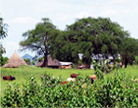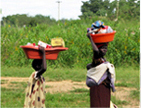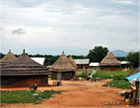On March 18, Chinese Ambassador to South Sudan, H.E. Mr. HUA Ning publishes an article titled Eliminating Poverty: China's Practices and Implications on Juba Monitor and No1. Citizen. The full text is as follows:
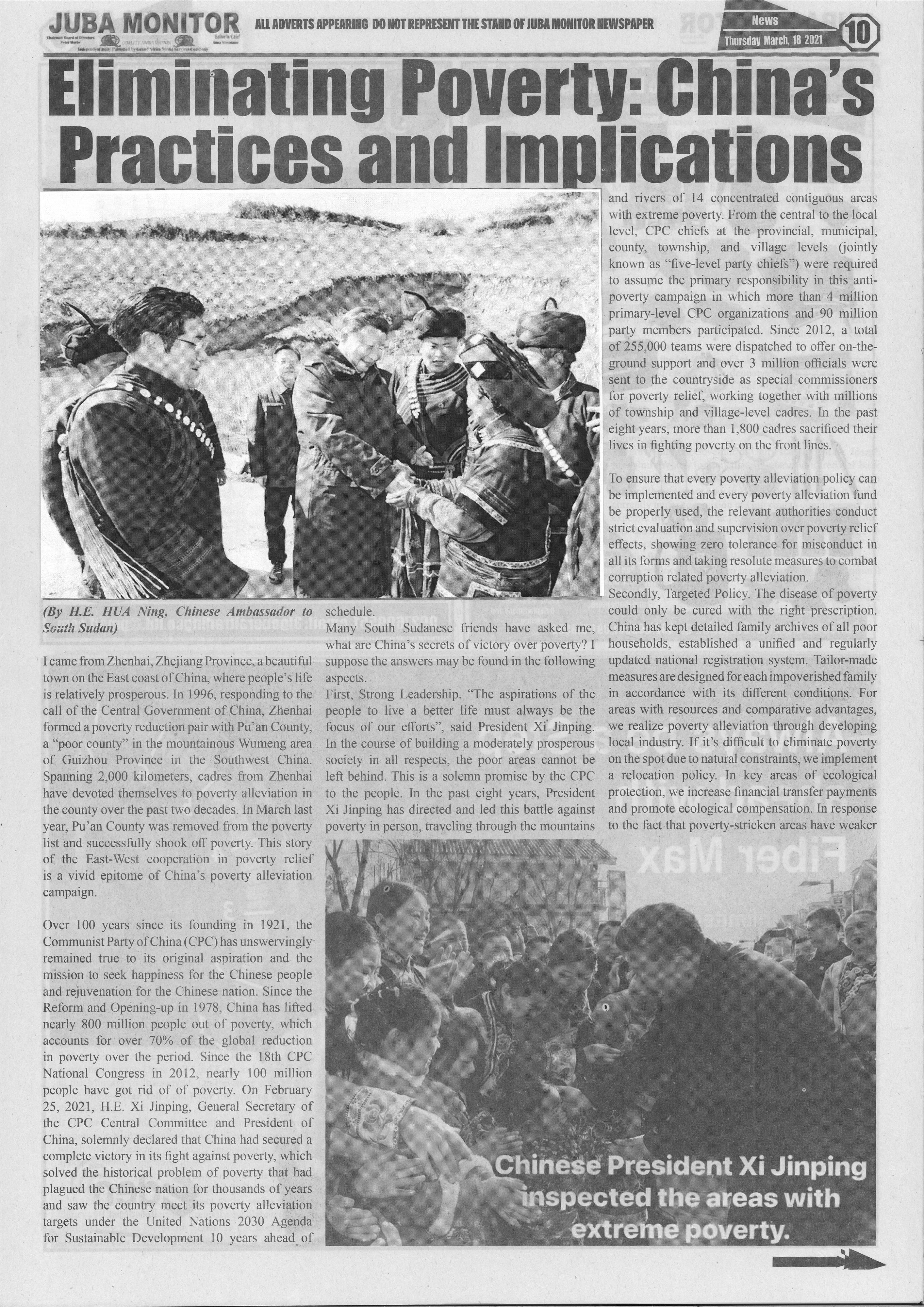
I came from Zhenhai, Zhejiang Province, a beautiful town on the East coast of China, where people’s life is relatively prosperous. In 1996, responding to the call of the Central Government of China, Zhenhai formed a poverty reduction pair with Pu’an County, a “poor county” in the mountainous Wumeng area of Guizhou Province in the Southwest China. Spanning 2,000 kilometers, cadres from Zhenhai have devoted themselves to poverty alleviation in the county over the past two decades. In March last year, Pu’an County was removed from the poverty list and successfully shook off poverty. This story of the East-West cooperation in poverty relief is a vivid epitome of China’s poverty alleviation campaign.
Over 100 years since its founding in 1921, the Communist Party of China (CPC) has unswervingly remained true to its original aspiration and the mission to seek happiness for the Chinese people and rejuvenation for the Chinese nation. Since the Reform and Opening-up in 1978, China has lifted nearly 800 million people out of poverty, which accounts for over 70% of the global reduction in poverty over the period. Since the 18th CPC National Congress in 2012, nearly 100 million people have got rid of of poverty. On February 25, 2021, H.E. Xi Jinping, General Secretary of the CPC Central Committee and President of China, solemnly declared that China had secured a complete victory in its fight against poverty, which solved the historical problem of poverty that had plagued the Chinese nation for thousands of years and saw the country meet its poverty alleviation targets under the United Nations 2030 Agenda for Sustainable Development 10 years ahead of schedule.
Many South Sudanese friends have asked me, what are China’s secrets of victory over poverty? I suppose the answers may be found in the following aspects.
First, Strong Leadership. “The aspirations of the people to live a better life must always be the focus of our efforts”, said President Xi Jinping. In the course of building a moderately prosperous society in all respects, the poor areas cannot be left behind. This is a solemn promise by the CPC to the people. In the past eight years, President Xi Jinping has directed and led this battle against poverty in person, traveling through the mountains and rivers of 14 concentrated contiguous areas with extreme poverty. From the central to the local level, CPC chiefs at the provincial, municipal, county, township, and village levels (jointly known as “five-level party chiefs”) were required to assume the primary responsibility in this anti-poverty campaign in which more than 4 million primary-level CPC organizations and 90 million party members participated. Since 2012, a total of 255,000 teams were dispatched to offer on-the-ground support and over 3 million officials were sent to the countryside as special commissioners for poverty relief, working together with millions of township and village-level cadres. In the past eight years, more than 1,800 cadres sacrificed their lives in fighting poverty on the front lines.
To ensure that every poverty alleviation policy can be implemented and every poverty alleviation fund be properly used, the relevant authorities conduct strict evaluation and supervision over poverty relief effects, showing zero tolerance for misconduct in all its forms and taking resolute measures to combat corruption related poverty alleviation.
Secondly, Targeted Policy. The disease of poverty could only be cured with the right prescription. China has kept detailed family archives of all poor households, established a unified and regularly updated national registration system. Tailor-made measures are designed for each impoverished family in accordance with its different conditions. For areas with resources and comparative advantages, we realize poverty alleviation through developing local industry. If it’s difficult to eliminate poverty on the spot due to natural constraints, we implement a relocation policy. In key areas of ecological protection, we increase financial transfer payments and promote ecological compensation. In response to the fact that poverty-stricken areas have weaker educational conditions and more stay-at-home children, we step up efforts to develop education. We also strengthen medical insurance and social assistance for poor people who are unable to work or suffer from serious illnesses. Through targeted poverty alleviation and comprehensive policy implementation, all people who have been lifted out of poverty need not worry about food and clothing and have access to compulsory education, basic medical services, and safe housing.
Thirdly, Infrastructure Connectivity. As a famous Chinese saying goes, “Building roads is the first step to become prosperous”. Isolation or insulation cannot bring about prosperity. Poverty alleviation cannot be achieved without the improvement of infrastructure. The Chinese government has invested heavily in promoting infrastructure connectivity in impoverished areas. By the end of 2019, China’s total length of roads in rural areas had reached 4.2 million kilometers, all townships and villages had paved roads. Now the power supply reliability rate of the rural power grid has reached 99%, and 100% of the large power grids have been connected to power current. China has expanded fiber-optic internet access and 4G coverage to more than 98% in poor villages. With the continuous advancement of infrastructure connectivity, poor areas are no longer the backwaters. They are increasingly integrated into domestic and international markets, creating enabling conditions for rural revitalization.
Fourthly, Self-development Capabilities. People in poverty are not merely recipients of poverty alleviation, but also serve as agents of poverty elimination and prosperity. In China, we stimulate the enthusiasm and initiative of the poor by empowering them with “aspirations” and “intelligence” in the spirit of self-dependence and diligence with a view to ensuring the sustainability of poverty alleviation. Industry is critical to realizing steady poverty alleviation. Capitalizing on local natural resources, poverty-stricken areas have developed various businesses, thus boosting local economic growth and providing job opportunities for the poor. China takes education as the fundamental solution to poverty, giving great priority of education resources towards poverty-stricken areas, developing various forms of vocational education and skill training so that the poor can master the necessary knowledge and skills and shake off poverty through their own hard work.
It has always been China’s assertion that the people are what human rights are all about. The rights to subsistence and development are the basic human rights of paramount importance. In that spirit, the Chinese government strives to achieve shared prosperity for everyone. Taking the Xinjiang Uygur Autonomous Region as an example, all 3 million impoverished people, 3,666 poor villages and 32 poor counties in Xinjiang have been lifted out of poverty under the current standards. The problem of absolute poverty in Xinjiang has become the “past tense” and people of all ethnic groups live and work in peace and contentment.
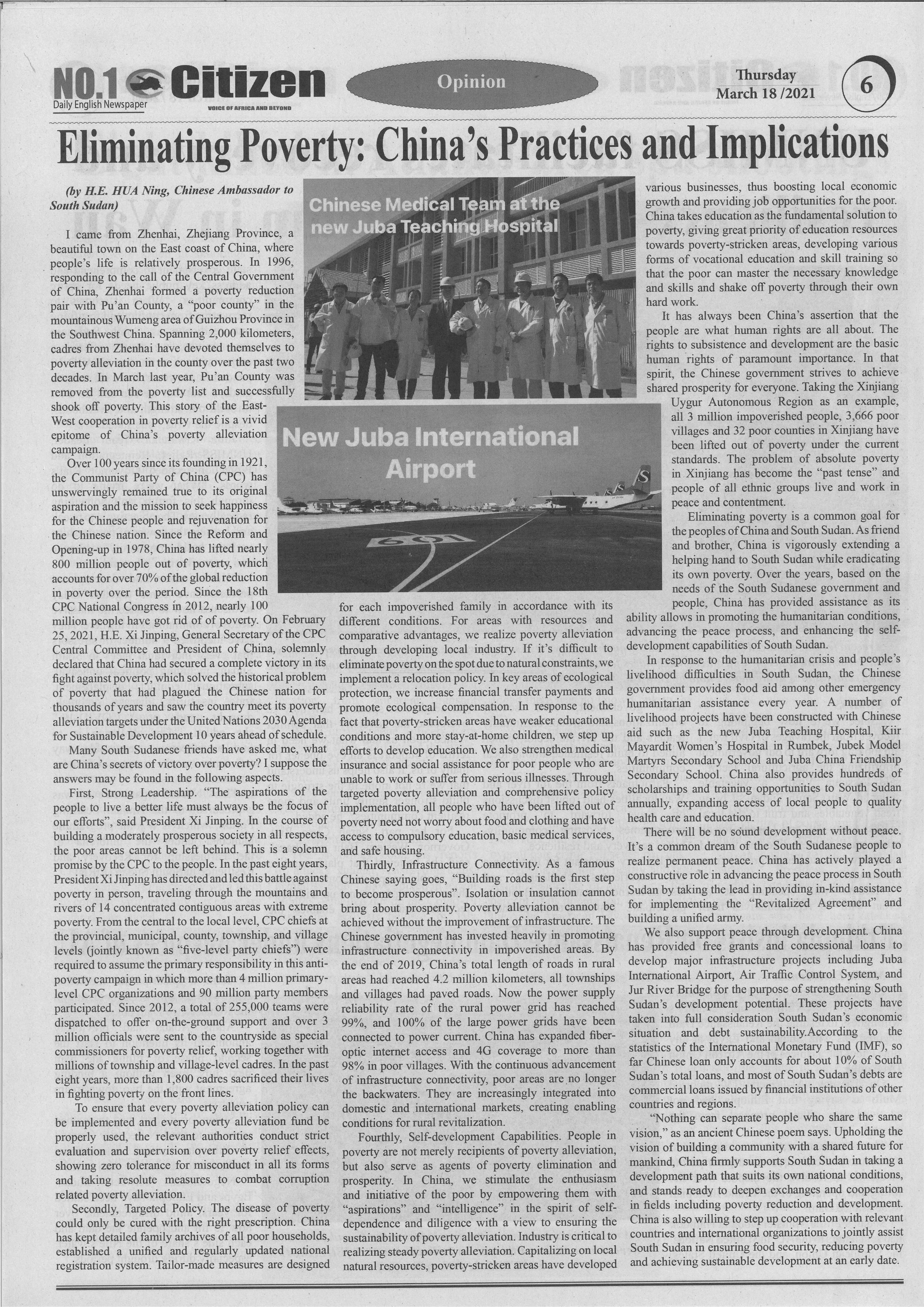
Eliminating poverty is a common goal for the peoples of China and South Sudan. As friend and brother, China is vigorously extending a helping hand to South Sudan while eradicating its own poverty. Over the years, based on the needs of the South Sudanese government and people, China has provided assistance as its ability allows in promoting the humanitarian conditions, advancing the peace process, and enhancing the self-development capabilities of South Sudan.
In response to the humanitarian crisis and people’s livelihood difficulties in South Sudan, the Chinese government provides food aid among other emergency humanitarian assistance every year. A number of livelihood projects have been constructed with Chinese aid such as the new Juba Teaching Hospital, Kiir Mayardit Women’s Hospital in Rumbek, Jubek Model Martyrs Secondary School and Juba China Friendship Secondary School. China also provides hundreds of scholarships and training opportunities to South Sudan annually, expanding access of local people to quality health care and education.
There will be no sound development without peace. It’s a common dream of the South Sudanese people to realize permanent peace. China has actively played a constructive role in advancing the peace process in South Sudan by taking the lead in providing in-kind assistance for implementing the “Revitalized Agreement” and building a unified army.
We also support peace through development. China has provided free grants and concessional loans to develop major infrastructure projects including Juba International Airport, Air Traffic Control System, and Jur River Bridge for the purpose of strengthening South Sudan’s development potential. These projects have taken into full consideration South Sudan’s economic situation and debt sustainability.According to the statistics of the International Monetary Fund (IMF), so far Chinese loan only accounts for about 10% of South Sudan's total loans, and most of South Sudan's debts are commercial loans issued by financial institutions of other countries and regions.
“Nothing can separate people who share the same vision,” as an ancient Chinese poem says. Upholding the vision of building a community with a shared future for mankind, China firmly supports South Sudan in taking a development path that suits its own national conditions, and stands ready to deepen exchanges and cooperation in fields including poverty reduction and development. China is also willing to step up cooperation with relevant countries and international organizations to jointly assist South Sudan in ensuring food security, reducing poverty and achieving sustainable development at an early date.


